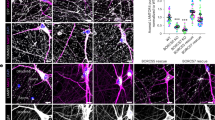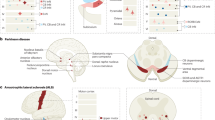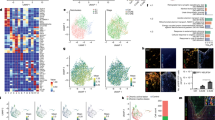Abstract
After inhibition of cytochrome c oxidase by nitric oxide1,2,3, astrocytes maintain energy production by upregulating glycolysis4,5 — a response which does not seem to be available to neurons. Here, we show that in astrocytes, after inhibition of respiration by nitric oxide, there is a rapid, cyclic GMP-independent increase in the activity of 6-phosphofructo-1-kinase (PFK1), a master regulator of glycolysis6, and an increase in the concentration of its most powerful positive allosteric activator7, fructose-2,6-bisphosphate (F2,6P2). In neurons, nitric oxide failed to alter F2,6P2 concentration or PFK1 activity. This failure could be accounted for by the much lower amount of 6-phosphofructo-2-kinase (PFK2, the enzyme responsible for F2,6P2 biosynthesis8) in neurons. Indeed, full activation of neuronal PFK1 was achieved by adding cytosol from nitric oxide-treated astrocytes. Furthermore, using the small interfering RNA (siRNA) strategy9, we demonstrated that the rapid activation of glycolysis by nitric oxide is dependent on phosphorylation of the energy charge-sensitive AMP-activated protein kinase, resulting in activation of PFK2 and protection of cells from apoptosis. Thus the virtual absence of PFK2 in neurons may explain their extreme sensitivity to energy depletion and degeneration4,5,10.
This is a preview of subscription content, access via your institution
Access options
Subscribe to this journal
Receive 12 print issues and online access
$209.00 per year
only $17.42 per issue
Buy this article
- Purchase on Springer Link
- Instant access to full article PDF
Prices may be subject to local taxes which are calculated during checkout




Similar content being viewed by others
References
Cleeter, M.W.J., Cooper, J.M., Darley-Usmar, V.M., Moncada, S. & Schapira, A.H. Reversible inhibition of cytochrome c oxidase, the terminal enzyme of the mitochondrial respiratory chain, by nitric oxide. Implications for neurodegenerative diseases. FEBS Lett. 345, 50–54 (1994).
Brown, G.C. & Cooper, C.E. Nanomolar concentrations of nitric oxide reversibly inhibit synaptosomal respiration by competing with oxygen at cytochrome oxidase. FEBS Lett. 356, 295–298 (1994).
Schweizer, M. & Richter, C. Nitric oxide potently and reversibly deenergizes mitochondria. Biochem. Biophys. Res. Commun. 204, 169–175 (1994).
Bolaños, J.P., Peuchen, S., Heales, S.J.R., Land, J.M. & Clark, J.B. Nitric oxide-mediated inhibition of the mitochondrial respiratory chain in cultured astrocytes. J. Neurochem. 63, 910–916 (1994).
Almeida, A., Almeida, J., Bolaños, J.P. & Moncada, S. Different responses of astrocytes and neurons to nitric oxide: the role of glycolytically-generated ATP in astrocyte protection. Proc. Natl Acad. Sci. USA 98, 15294–15299 (2001).
Uyeda, K. Phosphofructokinase. Adv. Enzymol. Relat. Areas Mol. Biol. 48, 193–244 (1979).
Van Schaftingen, E., Lederer, B., Bartrons, R. & Hers, H.G. A kinetic study of pyrophosphate: fructose-6-phosphate phosphotransferase from potato tubers. Application to a microassay of fructose 2,6-bisphosphate. Eur J Biochem 129, 191–195 (1982).
Hue, L. & Rider, M.H. Role of fructose 2,6-bisphosphate in the control of glycolysis in mammalian tissues. Biochem. J. 245, 313–324 (1987).
Brummelkamp, T.R., Bernards, R. & Agami, R. A system for stable expression of short interfering RNAs in mammalian cells. Science 296, 550–553 (2002).
Brorson, J.R., Schumacker, P.T. & Zhang, H.P. Nitric oxide acutely inhibits neuronal energy production. J. Neurosci. 19, 147–158 (1999).
Sanchez-Martinez, C., Estevez, A.M. & Aragon, J.J. Phosphofructokinase C isozyme from ascites tumor cells: cloning, expression, and properties. Biochem Biophys Res Commun. 271, 635–640 (2000).
Kawaguchi, T., Veech, R.L. & Uyeda, K. Regulation of energy metabolism in macrophages during hypoxia. Roles of fructose 2,6-bisphosphate and ribose 1,5-bisphosphate. J. Biol. Chem. 276, 28554–28561 (2001).
Hers, H.G. & Van Schaftingen, E. Fructose 2,6-bisphosphate 2 years after its discovery. Biochem. J. 206, 1–12 (1982).
Pilkis, S.J., Claus, T.H., Kurland, I.J. & Lange, A.J. 6-Phosphofructo-2-kinase/fructose-2,6-bisphosphatase: a metabolic signaling enzyme. Annu. Rev. Biochem. 64, 799–835 (1995).
Okar, D.A. et al. PFK-2/FBPase-2: maker and breaker of the essential biofactor fructose-2,6-bisphosphate. Trends Biochem. Sci. 26, 30–35 (2001).
Perez, J.X. et al. Overexpression of fructose 2,6-bisphosphatase decreases glycolysis and delays cell cycle progression. Am. J. Physiol. 279, C1359–C1365 (2000).
Manzano, A. et al. Molecular cloning, expression, and chromosomal localization of a ubiquitously expressed human 6-phosphofructo-2-kinase/ fructose-2, 6-bisphosphatase gene (PFKFB3). Cytogenet. Cell Genet. 83, 214–217 (1998).
Hirata, T., Kato, M., Okamura, N., Fukasawa, M. & Sakakibara, R. Expression of human placental-type 6-phosphofructo-2-kinase/fructose 2,6-bisphosphatase in various cells and cell lines. Biochem Biophys Res Commun. 242, 680–684 (1998).
Sakakibara, R. et al. Characterization of a human placental fructose-6-phosphate, 2-kinase/fructose-2,6-bisphosphatase. J. Biochem. 122, 122–128 (1997).
Chesney, J. et al. An inducible gene product for 6-phosphofructo-2-kinase with an AU-rich instability element: role in tumor cell glycolysis and the Warburg effect. Proc. Natl Acad. Sci. USA 96, 3047–3052 (1999).
Navarro-Sabate, A. et al. The human ubiquitous 6-phosphofructo-2-kinase/fructose-2,6-bisphosphatase gene (PFKFB3): promoter characterization and genomic structure. Gene 264, 131–138 (2001).
Ambrosio, S., Ventura, F., Rosa, J.L. & Bartons, R. Fructose 2,6-bisphosphate in hypoglycemic rat brain. J. Neurochem. 57, 200–203 (1991).
Hardie, D.G. & Carling, D. The AMP-activated protein kinase-fuel gauge of the mammalian cell. Eur. J. Biochem. 246, 259–273 (1997).
Marsin, A.S. et al. Phosphorylation and activation of heart PFK-2 by AMPK has a role in the stimulation of glycolysis during ischaemia. Curr. Biol. 10, 1247–1255 (2000).
Ishikawa, E., Ogushi, S., Ishikawa, T. & Uyeda, K. Activation of mammalian phosphofructokinases by ribose 1,5-bisphosphate. J. Biol. Chem. 265, 18875–18878 (1990).
Gutmann, I. & Wahlefeld, A.W. in Methods of Enzymatic Analysis (ed. Bergmeyer, H.U.) 1464–1468 (Verlag Chemie GmbH, Weinheim, 1974).
Van Schaftingen, E., Lederer, B., Bartrons, R. & Hers, H.G. A kinetic study of pyrophosphate: fructose-6-phosphate phosphotransferase from potato tubers. Application to a microassay of fructose 2,6-bisphosphate. Eur J Biochem 129, 191–195 (1982).
Lowry, O.H., Rosebrough, N.J., Lewis-Farr, A. & Randall, R.J. Protein measurement with the Folin phenol reagent. J. Biol. Chem. 193, 265–275 (1951).
Acknowledgements
This work was funded by FIS (A.A.), Fundación CNIC (S.M.) and Ministerio de Ciencia y Tecnología (SAF2001/1961; J.P.B.). S.M. is partially funded by the Medical Research Council (U.K.). Technical assistance from M. Delgado-Esteban and M. Resch (CNIC, Spain) and M. C. Alguero (Hospital Universitario de Salamanca, Spain) are greatly appreciated. We are grateful to A. Higgs for critical evaluation of this paper.
Author information
Authors and Affiliations
Corresponding author
Ethics declarations
Competing interests
The authors declare no competing financial interests.
Supplementary information
Rights and permissions
About this article
Cite this article
Almeida, A., Moncada, S. & Bolaños, J. Nitric oxide switches on glycolysis through the AMP protein kinase and 6-phosphofructo-2-kinase pathway. Nat Cell Biol 6, 45–51 (2004). https://doi.org/10.1038/ncb1080
Received:
Accepted:
Published:
Issue Date:
DOI: https://doi.org/10.1038/ncb1080
This article is cited by
-
PFKFB3 in neovascular eye disease: unraveling mechanisms and exploring therapeutic strategies
Cell & Bioscience (2024)
-
Fatty acid oxidation organizes mitochondrial supercomplexes to sustain astrocytic ROS and cognition
Nature Metabolism (2023)
-
Klotho increases antioxidant defenses in astrocytes and ubiquitin–proteasome activity in neurons
Scientific Reports (2023)
-
Cancer and Alzheimer’s Inverse Correlation: an Immunogenetic Analysis
Molecular Neurobiology (2023)
-
Astrocyte-Neuronal Communication and Its Role in Stroke
Neurochemical Research (2023)



